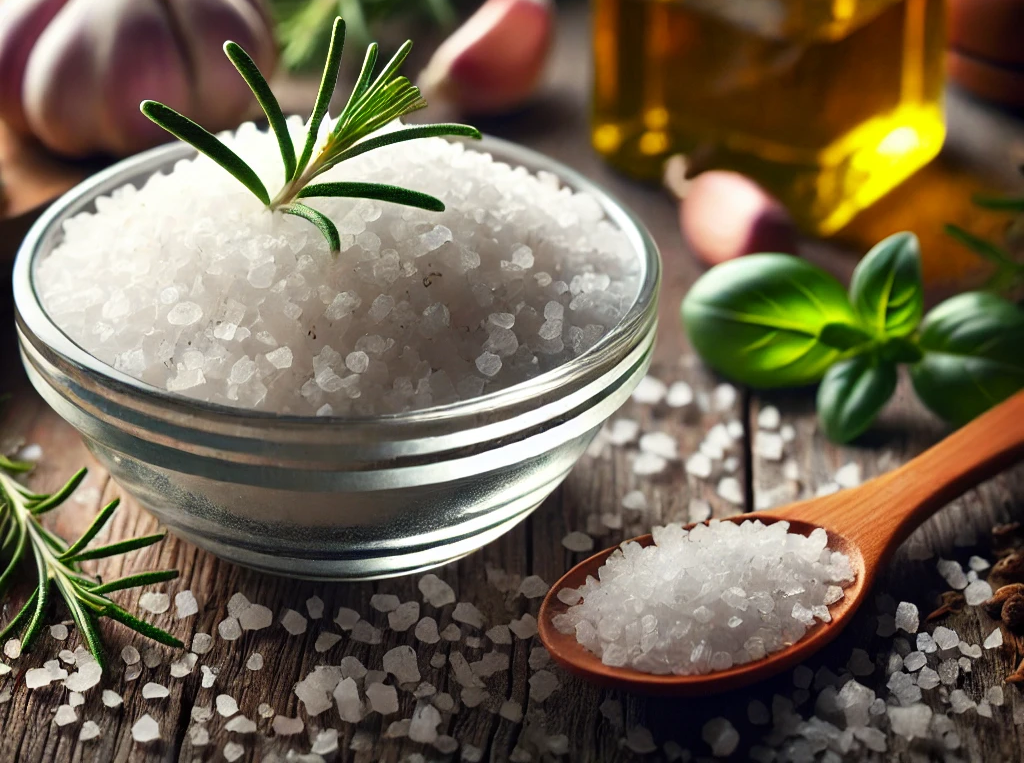Sea salt, a natural mineral harvested from evaporated seawater, is more than just a flavorful seasoning—it’s a nutrient-rich addition to a healthy lifestyle. Unlike regular table salt, sea salt retains trace minerals like magnesium, potassium, and calcium, which offer a range of health benefits. Known for its ability to support hydration, balance electrolytes, and promote skin health, sea salt is a versatile and beneficial ingredient.
Health Benefits of Sea Salt
Supports Hydration: Sea salt contains a variety of minerals that help balance electrolytes in the body. The sodium, magnesium, and potassium found in sea salt can assist in maintaining proper hydration, especially when consumed in small amounts after exercise or physical activity.
Improves Digestion: The minerals in sea salt help stimulate the production of digestive fluids, which can improve overall digestion. It may also assist in promoting a healthy gut microbiome, which plays a crucial role in digestion and nutrient absorption.
Enhances Skin Health: Sea salt is known for its natural exfoliating properties and is often used in bath products and skin treatments. The minerals in sea salt can help detoxify the skin, improve circulation, and support a healthy complexion. It may also help soothe conditions like eczema or acne when applied topically.
Supports Healthy Blood Pressure: In moderation, sea salt may help balance blood pressure levels by providing essential minerals like potassium and magnesium, which help regulate fluid balance and support cardiovascular health. However, excessive consumption can lead to high blood pressure, so it’s important to use it in moderation.
Promotes Respiratory Health: Inhaling steam or saline solutions containing sea salt can help clear mucus and allergens from the respiratory system. Sea salt is often used in saline nasal sprays or nebulizers to help with conditions like allergies, asthma, or sinus infections.
Boosts Bone Health: Sea salt contains trace minerals, such as calcium and magnesium, which are essential for maintaining healthy bones. These minerals contribute to bone strength and may help prevent osteoporosis and other bone-related conditions.
Aids Detoxification: Sea salt is believed to support the body’s natural detoxification processes by helping to flush out toxins through sweat and urine. A warm bath with sea salt may promote relaxation while helping to remove impurities from the skin.
Uses of Sea Salt
Flavor Enhancer: Sea salt is commonly used to season food, enhancing the flavor of dishes. It can be used in cooking, baking, and as a finishing touch on various foods.
Textural Element: Coarse sea salt can add a crunchy texture to dishes, making it popular for sprinkling on meats, vegetables, and baked goods.
Food Preservation: Sea salt has been used historically for preserving food, particularly meats and fish, due to its ability to inhibit the growth of bacteria.
Health and Wellness: Some people use sea salt in bath products, believing it can help with relaxation and skin health. Epsom salt, which is different from sea salt, is often used for this purpose.
Safety Considerations
Sodium Intake: Like all salts, sea salt is high in sodium. Excessive sodium intake can lead to health issues such as high blood pressure, heart disease, and stroke. It’s important to consume salt in moderation.
Iodine Content: Unlike table salt, which is often iodized (fortified with iodine), sea salt may not contain sufficient iodine. Iodine is essential for thyroid function, so individuals who do not consume iodized salt or iodine-rich foods should be mindful of their iodine intake.
Allergic Reactions: While rare, some individuals may have allergies or sensitivities to certain minerals found in specific types of sea salt. If you experience any adverse reactions, consult a healthcare provider.
Quality and Purity: The quality of sea salt can vary based on its source. Some sea salts may contain impurities or additives. It’s advisable to choose high-quality, pure sea salt from reputable sources.
Pregnancy and Health Conditions: Pregnant individuals and those with certain health conditions (such as hypertension) should consult a healthcare provider regarding their salt intake.
Conclusion
Sea salt is a natural and nutrient-rich alternative to regular table salt, offering a variety of health benefits. Packed with trace minerals like magnesium, potassium, and calcium, it helps maintain hydration, balance electrolytes, and support overall health. Beyond its dietary uses, sea salt promotes skin health and relaxation when used in baths or skincare products. Incorporating sea salt into your daily routine is a simple and effective way to enhance your well-being naturally.
